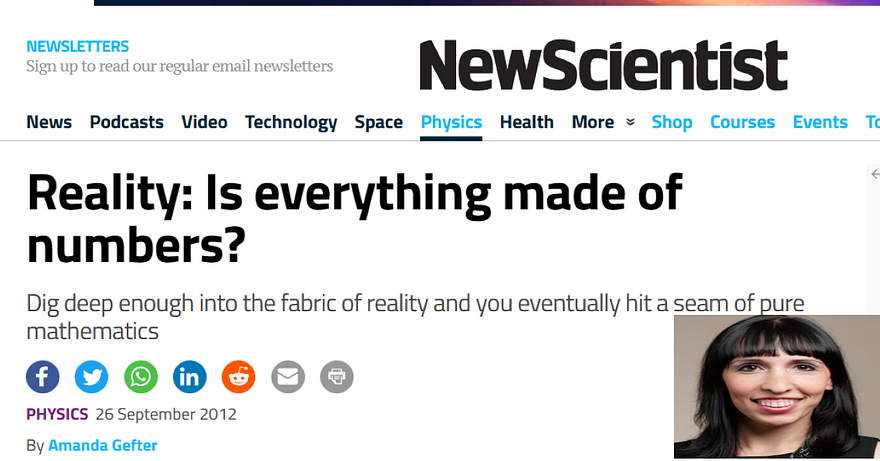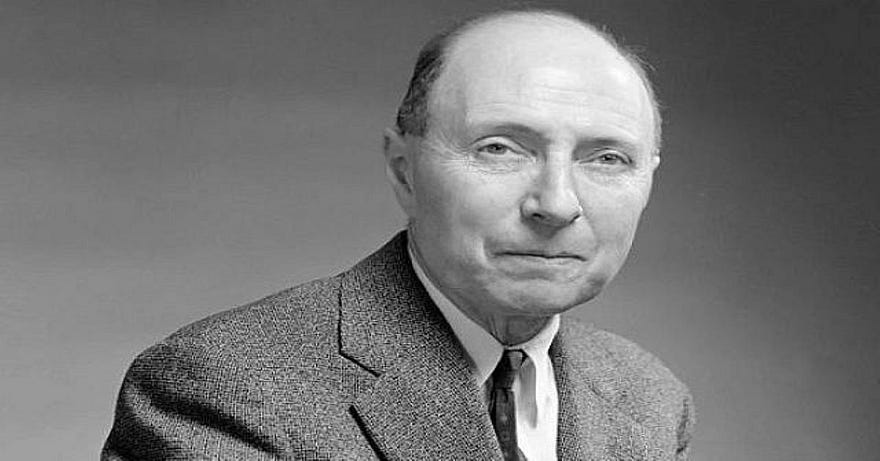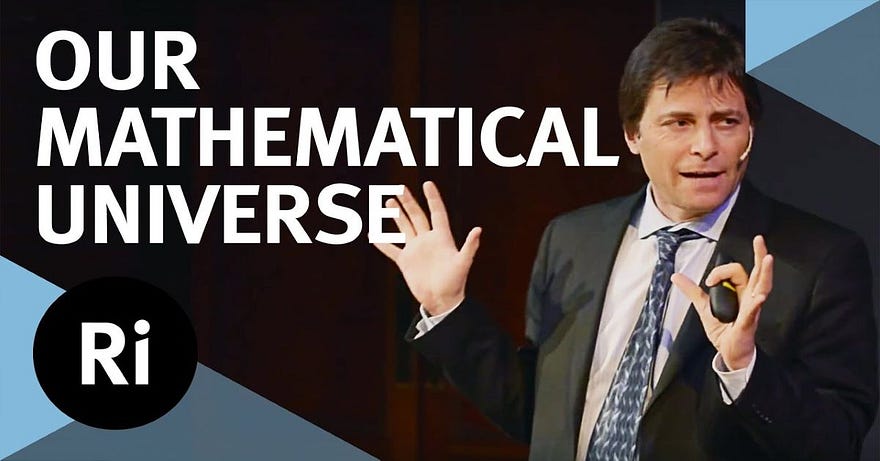A New Scientist writer asks her readers two questions: (1) “How did Einstein’s equations ‘know’ that the universe was expanding, when he did not?” (2) “How is it possible that mathematics ‘knows’ about Higgs particles?”… What do these questions mean? Are they anthropomorphic in nature?

Introduction: Mathematics Knows Things
In an article called ‘Reality: Is everything made of numbers?’, the New Scientist’s Amanda Gefter sets the scene in the following way:
“When Albert Einstein finally completed his general theory of relativity in 1916, he looked down at the equations and discovered an unexpected message: the universe is expanding.”
However:
“Einstein didn’t believe the physical universe could shrink or grow, so he ignored what the equations were telling him.”
What is directly relevant to this essay is Gefter’s following question:
“How did Einstein’s equations ‘know’ that the universe was expanding, when he did not?”
Interestingly, Amanda Gefter then applies the very same reasoning to Higgs particles. Indeed, she even uses the word “knows” again. (Which is also put in scare quotes.) She writes:
“How is it possible that mathematics ‘knows’ about Higgs particles or any other feature of physical reality?”
These questions have an anthropomorphic ring to them. Indeed, they’re more anthropomorphic (see here too) than some comments about ants or dolphins
So is Amanda Gefter excused from accusations of anthropomorphism simply because she puts the word “know” in scare quotes?
The problem here is that if her words aren’t taken literally, then it’s hard to think of an alternative way of taking them.
So it all depends.
Perhaps Gefter’s use of the word “know” is, at least partly, explained in the following passage from her article:
“‘Maybe it’s because math is reality,’ says physicist Brian Greene of Columbia University, New York. Perhaps if we dig deep enough, we would find that physical objects like tables and chairs are ultimately not made of particles or strings, but of numbers.”
This maths-is-reality stance will be tackled later.
So now let’s return to Gefter’s comments on Einstein ruling out an expanding universe.
Einstein Rejects the Universe’s Expansion

Much has been written about the scientific, philosophical and even religious reasons why Einstein might have (initially) ruled out the expansion of the universe. So these reasons may explain why he also rejected (to use a phrase used by many writers about many physicists) “what the mathematics was telling him” or what the maths knew.
However, the maths might not have been (as it were) running off in its own direction at all. Instead, Einstein might have simply rejected his own equations for all the reasons just mentioned. [See Einstein’s ‘Physical cosmology’.]
So it was still (perhaps paradoxically) Einstein’s own maths (or equations) which supposedly knew stuff which he didn’t know. That is, it wasn’t someone else’s maths. And it wasn’t (as it were) math’s very own maths either.
This means that maths itself (or maths alone) didn’t know that the universe is expanding.
That’s mainly because maths — i.e., on its own — doesn’t include the notions of the universe, expansion, gravity, space, matter, mass, etc. These are terms from physics and cosmology, not (pure) mathematics.
Thus, the equations which Einstein both created and used led to (physical) consequences which Einstein rejected. However, that didn’t mean that there was any genuine independence of the equations from Einstein himself. (This isn’t a reference to maths — as it were — in the abstract, but to the equations which Einstein himself created.) After all, if Einstein hadn’t recognised his famous cosmological “blunder”, then the maths still couldn’t have known anything he didn’t know. And, again, Einstein arguably rejected his own equations for reasons that had nothing to do with maths. Yet it was still his own equations which he rejected. That is, the equations which Einstein rejected didn’t create themselves, let alone show that they has applications to the notions in physics which were around in the early 20th century.
Input and Output
The New Scientist’s Amanda Gefter continues with this basic input-output scenario:
“If mathematics is nothing more than a language we use to describe the world, an invention of the human brain, how can it churn out anything beyond what we put in?”
We humans “put in” all sorts of stuff into all sorts of things. These things “churn out” all sorts of other stuff which is different to what we put in.
For example, we put coal into a stove and it churns out heat and smoke. We put data into a computer and it churns out all sorts of information which we didn’t put in.
There are literally innumerable examples of this.
So what we put in is transformed into something else. That something else is still a byproduct of what we put in. Thus heat and smoke are byproducts of putting coal in a stove. And, as many people who’re critical of the claims of artificial intelligence are keen to tell us, computers wouldn’t churn out anything if we hadn’t firstly put in the data (as well as if we hadn’t built the computer in the first place).
So perhaps this New Scientist writer has something distinct in mind when it comes to mathematics.
Well, mathematics is definitely distinct from a stove and what we we put into it. Similarly, its not like a computer or the data we put into it (though mathematical data can be fed into a computer).
But so what?
A stove isn’t a computer either. And an apple isn’t an orange.
Amanda Gefter also says that some (or many) scientists believe that maths is “nothing more than a language we use to describe the world”.
Pure Maths and Describing the World
Very few mathematicians and physicists have ever claimed that mathematics “is nothing more than a language we use to describe the world”. There is, after all, such a thing as pure mathematics (see also ‘Applied Mathematics’). That is, there is much maths which doesn’t — and perhaps even couldn’t — have any use in terms of “describing the world”.
This may be debatable, however.
Even some arcane mathematics in history came to have a use in physics. However, such maths obviously had a previous independence from physics for the simple fact that it existed for years — even hundreds of years — before physicists found a use for it.
Similarly, even those people who claim that maths is (to use Gefter’s words again) “an invention of the human brain” don’t see it simply in terms of its use in describing the world. So maths can be such an “invention”, and yet still have no use in physics — or anywhere else.
Predictably, Amanda Gefter then mentions and quotes the theoretical physicist Eugene Wigner (1902–1995).
Eugene Wigner

Gefter writes:
“‘It is difficult to avoid the impression that a miracle confronts us here,’ wrote physicist Eugene Wigner in his classic 1960 paper ‘The unreasonable effectiveness of mathematics in the natural sciences’ (Communications on Pure and Applied Mathematics, vol 13, p 1).”
Wigner himself also wrote:
“The miracle of the appropriateness of the language of mathematics for the formulation of the laws of physics is a wonderful gift which we neither understand nor deserve.”
So, relevantly, now let’s requote Gefter quoting Brian Greene:
“‘Maybe it’s because math is reality,’ says physicist Brian Greene of Columbia University, New York. Perhaps if we dig deep enough, we would find that physical objects like tables and chairs are ultimately not made of particles or strings, but of numbers.”
Isn’t it best to state that reality is maths (or, less strongly, reality is mathematical), rather than Brian Greene’s “math is reality”? At least that’s how Pythagoreans and many physicists have put it over the years. That said, if you reverse a mathematical identity, then nothing is really changed. Thus if we have 2 + 2 = 4, and then reverse it to 4 = 2 + 2, then we get the same result. So perhaps stating that maths is reality is the same as stating that reality is maths.
In any case, why does it automatically follow that maths knows things simply because maths is reality?
That is, even if maths is reality, it would still require physicists to know that. Physicists also need to realise that maths and reality are one and the same thing. That is, if maths is reality (or if reality is maths), then physicists would still need to construct the equations and theories which help show us that that this is the case.
Indeed, if there is a necessary — and indeed blindingly obvious — contribution from physicists to this (as it were) maths = reality equation, then that equation may not hold at all. After all, physicists often get the maths-of-reality wrong. They also offer us contradictory maths-of-reality.
The physicist and cosmologist Max Tegmark also mentions Eugene Wigner a couple of times (i.e., in his book Our Mathematical Universe). Tegmark is clearly inspired by Wigner’s well-known questions and points.
Max Tegmark

So we have the following passage from Wigner, which Tegmark quotes:
“The enormous usefulness of mathematics in the natural sciences is something bordering on the mysterious and there is no rational explanation for it.”
Albert Einstein also asked the same question in the following:
“How can it be that mathematics, being after all a product of human thought which is independent of experience, is so admirably appropriate to the objects of reality?”
… But hang on a minute!
Einstein’s following oft-quoted conclusion (as found in his ‘Geometry and Experience’) appears to be radically at odds with both Wigner’s and Tegmark’s positions:
“[] In my opinion the answer to this question is, briefly, this: As far as the laws of mathematics refer to reality, they are not certain; and as far as they are certain, they do not refer to reality.”
So does the “unreasonable effectiveness” of electricity or roads also “demand an explanation”? That ironic question is asked because there are indeed explanations of maths effectiveness. However, I feel that they won’t satisfy mathematical mysterians like Max Tegmark.
The theoretical physicist Lee Smolin (1955-) also refers to “the obvious effectiveness of mathematics in physics”.
Lee Smolin

Smolin initially refers to the purely pragmatic utility of mathematics when it comes to physics.
Thus, we can all happily accept the unreasonable effectiveness of mathematics in physics.
But where do we go from there?
Smolin himself goes on to state that he has
“never heard a good a priori argument that the world must be organised according to mathematical principles”.
Again: mathematics is useful — extremely useful — in physics. So much so that there wouldn’t be any modern physics without maths. That said, it still can’t be concluded from this effectiveness that (to use Smolin’s words again) “the world must be organised according to mathematical principles”.
In other words, the unreasonable effectiveness of mathematics doesn’t mean — or have the consequence — that the world itself is (or must be) organised according to mathematical principles. Of course, it gives physicists reasons — even very good reasons — to believe that. However, the effectiveness of mathematics in physics — alone — doesn’t have the (logical) consequence that the world itself must be organised according to mathematical principles.
And it certainly doesn’t mean that (as Brian Greene put it) “math is reality” (or that reality is maths).
More specifically, when Smolin uses the words “a good a priori argument” (or simply when he uses the epistemological term a priori), he seems to be saying that many physicists simply assume that “the world” (or Nature) is mathematical precisely because of the unreasonable effectiveness of mathematics in physics…
All this is very close to being a circular position. Thus:
(i) Mathematics is unreasonably effective in physics because the world itself is mathematical.
(ii) Because the world itself is mathematical, it logically follows that the mathematics in physics will be unreasonably effective.
However, isn’t the above like making the following (admittedly much weaker or less sexy) claim? —
(i) Cement is unreasonably effective when it comes to building houses.
(ii) Therefore houses must be built on cement-based principles.
Later on in the same chapter, Smolin goes on to be even more explicit about these assumptions when he writes the following words:
“[W]hat is both wonderful and terrifying is that is absolutely no reason that nature at its deepest level must have anything to do with mathematics.”
At first sight, this seems like an incredible claim.
Or at least one would presume that many— or even most — physicists would have (deep?) problems with Smolin’s statement.
However, that shock may simply be down — again — to the false inference (which many physicists make) from the the unreasonable effectiveness of mathematics to the conclusion that nature itself (“at its deepest level”) must be mathematical.
To repeat: we have the following line of reasoning from some (or even many) mathematical and theoretical physicists:
(i) Mathematics is unreasonably effective in physics.
(ii) Therefore the world itself must be organised according to mathematical principles.
Now it must be borne in mind that not all (or even most) physicists actually express (or even think — in great detail — about) these almost purely philosophical issues.
My flickr account and Twitter account.










No comments:
Post a Comment